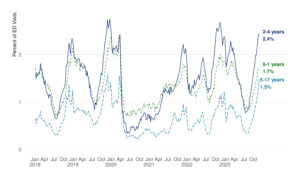Heart disease is the leading cause of death in the United States, but there’s a lot you can do to prevent it. Taking time to care for your heart can be challenging as you go about daily life. But it’s easier than you think to show your heart the love it deserves each day. Small acts of self-care, like taking walks, getting quality sleep, and cooking healthy meals, help your heart. Research shows that self-care can help you keep your blood pressure in a healthy range and reduce your risk of heart disease and stroke.
What does “self-care” mean?
Researchers define self-care as what you do to stay healthy. It’s also what you do to care for any health problems you have, such as high blood pressure, diabetes, or mental health disorders. It’s heart-healthy living.
What parts of your self-care routine help your heart?
Self-care for your heart is really self-care for your whole self. You can improve and protect your health overall when you:
- Get a daily dose of physical activity, such as a brisk, 30-minute walk.
- Cook meals that are low in sodium and unhealthy fats.
- Take your medications as prescribed and keep your medical appointments.
- Sleep 7-8 hours a night.
- Manage stress through, for example, meditation, yoga, a warm bath, or quiet time with a good book or funny movie.
- Try to reach or stay at a healthy weight by moving more and having snacks like fruits and veggies ready to grab when hunger hits.
How can you make self-care for your heart easier?
The trick is to plan ahead. Build heart-healthy activities into your daily self-care routine. Schedule things that are both good for you and important to you. You might want to set aside time to:
- Cook delicious, heart-healthy recipes. Choose some from the National Heart, Lung, and Blood Institute’s delicious heart-healthy eating website.
- Go for a bike ride, take an online exercise class, or have a family dance party.
- Make that doctor’s appointment you’ve been putting off. Many providers now offer telehealth appointments to make accessing care easier.
- Organize your medications.
What’s your health status?
Part of self-care is knowing your health status. Even during uncertain and busy times, get your blood pressure, blood sugar, and cholesterol levels checked. Talk to your health care provider about your heart health.
How can technology help with caring for your heart?
Your phone or favorite show can make getting off the couch difficult. But technology can be your heart’s best friend! Tools that help with self-care for your heart include:
- Wearable devices that measure steps, heart rate, and sleep
- At-home blood pressure, blood sugar, and heart rate monitors
- Online activity and healthy eating planners, like these from health.gov and MyPlate.gov
How does support from others help you care for your heart?
Many studies show that having positive, close relationships and feeling connected to others helps our blood pressure, weight, overall health, and more. Even if it’s virtual, that support makes self-care easier and even more effective.
Research also shows that text messages can improve self-care. Connect with friends or family for support. Ask them to text you reminders or encouragement to help you meet your goals. Make new friends who share your goals. Join an online exercise class or a weight- management group to connect with other like-minded people and stay motivated.
How does self-care play a role if you or your partner is pregnant or considering pregnancy?
Self-care for your heart health is particularly important if you’re pregnant or thinking of becoming pregnant. Regular physical activity reduces your risk of gestational diabetes, extra pregnancy
pounds, and postpartum depression. Talk to your health care provider about what physical activities
are safe during pregnancy and
soon after delivery. Discuss how to avoid and watch for
a type of high blood pressure called preeclampsia.What are the obstacles to self-care?
Research shows that the three main obstacles to self-care are:
● Lack of confidence in one’s ability to make a change
● Depression
● Having more than one health concern
If you want to boost your confidence, or if you struggle with a mental health disorder, seek support of family and friends, or talk to a qualified mental health provider. Ask your health care provider for help handling the demands of multiple medical conditions.
What does it take to give your heart the care—and patience—it deserves?
Self-care includes being patient with your body. You may not see or feel the results of your efforts right away. But small steps can lead to big progress. When we take care of #OurHearts as part of our self-care, we set an example for others to do the same. Visit hearttruth.gov for resources and tools to help you and your loved ones make heart-healthy lifestyle changes.
Original Article – HM-2022-SelfCareTips-for-HeartHealth-508





